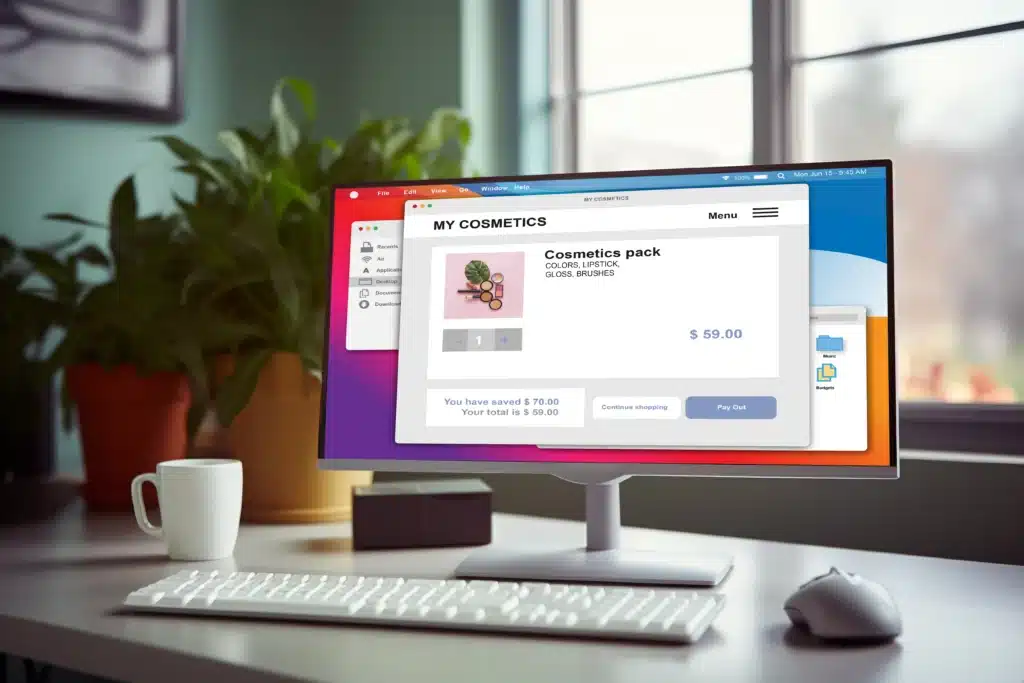Flutter has emerged as one of the most popular frameworks in recent years, with developers describing it as versatile, fast, and easy to use. Flutter was originally developed by Google for the development of mobile apps but has since grown into much more both with web and desktop development and created a lot of noise in the tech space. However, is Flutter good for web development? This blog will explore this question and compare it to traditional web development frameworks.
A Brief History of Flutter: From Mobile to Web
It was first introduced by Google in 2017 as a framework for mobile app development with high performance across multiple platforms. It quickly garnered attention for the fact that it could compile directly into native code, delivering a performance level almost on par with native iOS and Android apps.
Flutter began to branch out beyond mobile in 2019, when google announced experimental support to build web applications. These days, it is among the most preferred frameworks for developers to create an application for the web with a single codebase for mobile, web, and desktop.
Can You Build a Web App in Flutter?
Yes, you can! Flutter for Web allows developers to build responsive, high-performance web apps that run in the browser to new web technologies. Flutter for web development takes advantage of a shared codebase across platforms.
Similarly to the mobile version, Flutter’s web version has a widget-based structure with a rich UI toolkit. The framework translates Dart into HTML CSS and JavaScript to facilitate mobile deployment across platforms.
Is Flutter good for web app development?
Flutter is a great framework for web apps because it provides web apps with a codebase that can be reused across mobile and desktop applications.
The first among the many reasons is that Flutter is great for keeping that same look and feel across devices. Using the same set of widgets, which makes the development easier, irrespective of whether you are developing for mobile, desktop, or web. But Flutter for the web is still a work in progress, and it may not suit all use cases yet.
Can I use Flutter for web development?
Cross-platform with one codebase
Flutter allows you to write your app once and deploy it on several platforms: mobile, web, and desktop. This makes it more accessible to maintain and scale because it requires fewer codebases, ultimately resulting in less time and labor.
Fast Development
Flutter also has a “hot reload” capability that enables developers to see changes to their code in real-time without having to restart the app. This can really save a lot of time while developing, especially in web applications where we quickly want to make changes and iterate.
Rich and Interactive UI
Flutter contains a rich set of widgets that can be customized and used to make beautiful UIs. They can be used for mobile and web applications alike, allowing for consistent design across both platforms.
Strong Performance
Flutter being a compiled language, it can deliver good performance. For web development, Flutter compiles your app to highly optimized JavaScript code, resulting in faster load times and smoother user experiences.
Cross-Platform Development
A significant selling point of Flutter is how it can target multiple platforms from one codebase. But if your team is already building a mobile app with Flutter, you can implement a web version fairly easily.
Disadvantages of Creating a Web App with Flutter
Limited Browser Support
For all its promise, Flutter for Web doesn’t support every web browser equally. (Older browsers, especially Internet Explorer, may be problematic.) This might reduce the audience for your web app unless you introduce browser-specific workarounds.
Web-based Capabilities Remain in Development
This, too, is part of the problem of Flutter for web being in active development, so many things just are not as polished or done as they might be in a more traditional web development framework. For example, you may need to use workarounds for things like SEO optimization and accessibility.
Larger App Size
Since Flutter embeds many of its own resources (such as widgets and the Dart runtime), it can lead to a larger web app compared to applications built using traditional web technologies. Similarly, performance and loading times can be compromised, particularly on mobile networks.
Limited Third-Party Libraries
The Flutter ecosystem is expanding, but when compared to faster-established web frameworks such as React or Angular, third-party library support lags behind. Developers may need to create custom solutions for certain features, which can take a lot of time.

Flutter vs web development Framework
In the Flutter vs. web development comparison, conventional frameworks such as React, Angular, and Vue.js, and that all these things are still quite dominant in the space of building web apps. On the other hand, Flutter provides a distinct feature set, especially when it comes to cross-platform development.
Flutter vs. React: Though React is a popular solution for web development, given the size of its ecosystem and flexibility, Flutter offers a more unified solution with one codebase for mobile and web. React might have its mature tooling and community support, while Flutter triumphs in building apps with a uniform UI across platforms.
Flutter vs. Angular: Angular is a robust front-end framework that offers a complete solution for developing large and complex web applications. In contrast, Flutter’s focus is much more UI-centric, making it easier to build dazzling UX with less setup.
2025 Flutter Advantages and Disadvantages — Overview and Recommendations
Especially for cross-platform API use in 2025, Flutter still tops the list for web development. The main benefits of Kotlin are a shared code base, rapid development & rich UI. It still has some rough edges, though, such as browser support, app size, and third-party libraries. If you want to deliver on that promise and do so with code shareability across platforms, flutter is a great option.
Let’s start with the basics. What Is Flutter?
Flutter is an open-source UI toolkit created by Google. It enables developers to create natively compiled apps for mobile, web, and desktop from a single codebase. Flutter is a cross-platform framework written in the Dart language that is widely used for building modern applications due to its flexibility and powerful features.
Evolution of Cross-Platform Technologies
Cross-platform frameworks React Native, Xamarin, and PhoneGap scored low (or none) in mobile app development before Flutter. Flutter is different—it achieves performance similar to that of native applications and supports a single code base that targets iOS, Android, Web, and desktop platforms, making code redundancy for each platform unnecessary.
Can Flutter Be Used In Startups?
Flutter is a great choice for startups since it saves time and resources with a single codebase to build multiple platform applications without compromising performance or speed. Need to quickly develop and deploy your web app, Flutter may decrease your development cost and time-to-market.
Should You Use Flutter for Enterprise Application Development?
Flutter is definitely an excellent choice for enterprise applications that require multi-platform capabilities. It is especially beneficial in developing applications with enriched UIs, however, in case of larger enterprise systems that have intricate business logic, Flutter’s evolving ecosystem can be challenging.
Flutter Advantages
- Single codebase, cross-platform development.
- Rich UIs with customizable widgets.
- Performance improvement due to native compilation
- Development with a fast Hot Reload feature
- Active community and support from Google.
Flutter Disadvantages
- Experimental support on some older web browsers.
- Increased app size is affecting performance.
- It is not as mature as the ecosystem around other web technologies.
- The web-specific features are still being developed.
Can You Integrate Flutter into an Existing App?
Could we use Flutter in the already existing app? Flutter provides a feature known as Flutter Add-to-App, enabling developers to integrate Flutter into any existing native app so that you can update elements of your app while preserving the rest of the app as-is.
Flutter for Web
Flutter for Web is an exciting option for building web apps for developers looking for a cross-platform solution. While it is still evolving, it has certain advantages, like consistent UI across platforms and code reusability.
Flutter for Desktop
Flutter also offers desktop support for macOS, Windows, and Linux. This only adds to its attractiveness for companies seeking to create a unified solution across mobile, web, and desktop platforms.
Is Flutter Good for Web App Development?
Flutter has quickly gained popularity for mobile app development, but many wonder if it’s a good choice for web app development too. The short answer is yes, Flutter can be used for web development. Flutter allows you to build high-performance, visually rich applications that run on multiple platforms, including web, iOS, Android, and desktop, using a single codebase. But before diving into whether Flutter is the best option for your web app, let’s break down some of the key questions.
Can I use Flutter for web development?
Absolutely! Flutter for web development allows you to build interactive, modern websites and web applications. With its strong cross-platform capabilities, you can write your code once and deploy it on the web, mobile, and desktop, significantly speeding up the development process. However, it’s important to note that Flutter for web is still evolving. While it’s great for certain types of apps—especially those that require rich UI—there might be performance concerns for large-scale, content-heavy websites.
Is Flutter Better Than React for Web?
The answer depends on what your project needs. React has long been the go-to framework for web development due to its extensive ecosystem, rich libraries, and performance optimization tools. If your project requires complex interactions, SEO optimization, and large-scale integrations, React may be the better choice.
On the other hand, Flutter shines in applications that need beautiful, custom UIs, as well as cross-platform support. Flutter allows for more design flexibility with its wide array of widgets, but React offers a more mature and extensive web ecosystem. So, while Flutter can be a great tool for building web apps, React remains the more established choice for large web projects with extensive libraries and SEO considerations.
Why Is Flutter Not Used in Web?
While Flutter is making strides in the web development space, it is still relatively new compared to other web frameworks like React or Angular. Here are a few reasons why some developers hesitate to use it for web apps:
- Performance: Flutter web apps can be slower than those built with traditional web frameworks, especially for content-heavy or complex websites.
- SEO Limitations: Flutter apps, being single-page applications (SPAs), can present challenges for search engine optimization (SEO) since content is rendered dynamically.
- Limited Browser Support: Although Flutter works well on modern browsers, there can be issues with compatibility and performance on older browsers or certain edge cases.
Is Flutter Better Than Web Development?
This question seems to compare Flutter directly with web development itself, but the truth is, Flutter is a tool for web development rather than an alternative to it. It can be a great solution for specific use cases like mobile-first apps, cross-platform projects, and beautiful UIs, but for more traditional or content-driven web development, other technologies like React or Vue.js may be a better fit.
Flutter Website Examples
Some notable Flutter website examples include:
- Flutter Gallery: A showcase app for Flutter’s design capacities, featuring various interactive UI components.
- Google Ads: The Flutter framework powers some parts of Google Ads, indicating its potential for complex, interactive web applications.
- BMW: The car manufacturer used Flutter to build parts of their user interface for cross-platform support, including their web platform.
Flutter Pros and Cons: The Bottom Line
Since the release of its first version, Flutter has also made remarkable progress. Despite some shortcomings—such as with web-specific features and browser support—unifying mobile, web, and desktop development under a single umbrella presents a force to be reckoned with for developers using Flutter as their framework of choice. Flutter for Web is an exciting option for startups and businesses that require cross-platform capabilities. For a broader perspective on how web development technologies like Flutter are shaping the industry, check out our blog on The Future of Web Design, where we explore upcoming trends and innovations that could transform the way we build websites.
Frequently Asked Questions
Is Flutter enough for web development?
If you are building interactive, visually rich, and cross-platform applications, Flutter can be enough for web development. It offers a single codebase for web, mobile, and desktop and makes it a powerful tool for many use cases.
Why not use Flutter for the web?
While Flutter is great for web development, there are certain limitations:
- Performance Concerns: Flutter web apps may have larger initial load times compared to native web frameworks.
- SEO Challenges: Flutter’s single-page application (SPA) nature can make SEO optimization more difficult.
- Ecosystem and Community Support: Web-specific frameworks like React or Angular have more established ecosystems and libraries tailored for web use cases.
- Limited Browser Support: Some features may not perform as well across all browsers.
These factors might make other frameworks more suitable for web-specific projects.
Is Flutter better than React for the web?
It depends on your project’s requirements.
- Advantages of Flutter: Better for visually rich, custom UI applications with cross-platform needs.
- Advantages of React: Ideal for web-focused projects requiring advanced SEO, performance, and integration with existing web technologies.
React has a larger community, more web-specific libraries, and a long-standing reputation in web development, making it more suitable for traditional web projects. On the other hand, Flutter excels in unified development across platforms.
Can I use Flutter to build a website?
Yes, you can use Flutter to build a website. It is particularly effective for creating interactive, visually appealing, and cross-platform applications. However, keep in mind that it might not be the best choice for content-heavy websites or those requiring advanced SEO optimization.
Is Flutter frontend or backend?
Flutter is focused on frontend development, but it can interact with backend services through APIs for dynamic content and functionality.


